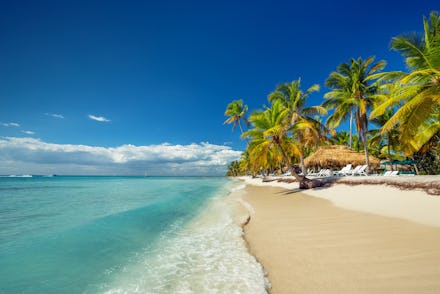Canceling your trip to the Dominican Republic could make the travel crisis worse

In the past year, 10 American tourists have died while on vacation in the Dominican Republic, with several of the deaths sharing disturbingly similar circumstances. Although no formal connection has been made between the incidents so far, people are freaked out — so much so that there's been a 74% drop in flight bookings from the United States to the D.R. this June, according to the travel trend agency ForwardKeys. But is this panic really warranted?
As CNN has pointed out, Americans are more likely to die stateside than in the Dominican Republic, and there's actually been a decline in unnatural tourist deaths in the D.R. in recent years. Statistically, traveling to the country doesn't pose an immediate danger. Even more, the people who've died had heart attacks, respiratory failure, or other things typically termed "natural causes." And while the U.S. State Department is working with the D.R. to investigate the deaths, it has not yet issued a safety advisory for the destination.
Still, it's understandable why so many people are concerned. In addition to the 10 deaths (which some experts theorize were actually caused by potentially contaminated alcohol), several more Americans have reported sicknesses following stays at popular D.R. resorts, a Delaware woman was recently attacked at a D.R. resort, two young American women died in a suspected D.R. car accident, and Boston Red Sox player David Ortiz was shot in a D.R. nightclub.
Despite the fact that heart attacks, car accidents, and random shootings can occur anywhere, these incidents have raised serious suspicions from travelers, so much so that travelers are cancelling vacations to the D.R. en masse. Delta and JetBlue are even allowing passengers with upcoming trips to cancel their flights without typical penalty fees. Yet while Americans may believe this storm of tragedies equates to a crisis, the D.R. doesn't agree.
"These cases are very regrettable, but isolated," Dominican Tourism Minister Francisco Javier Garcia said in a statement to CNN on June 15. A week later, he reassured the public that there is no "avalanche of deaths" nor are the incidents mysterious, citing the U.S. State Department for exaggerating the issue and inciting mass panic.
It's true that while the number of recent D.R.-set incidents is significant, the way the American media has reported on the news has exaggerated the dangers. And it's far from the first time this has happened. When teenager Natalee Holloway went missing in Aruba while vacationing with friends in 2005, the media obsessively covered the case and speculated on the island's dangers. As a result, U.S. visits to Aruba dropped by 7% the following year, due to what locals called "missing white woman syndrome," i.e. the widespread, disproportional panic that occurs whenever the media spotlights the case of a person fitting that description.
It's not just coverage of individual cases that can cause people to think twice about travel. In 2018, The New York Post published the sensationalist headline, "American Tourists Risk Death To Vacation In Mexico," citing shootings, drug trafficking, police corruption, and extortion as reasons Americans are putting themselves at risk by crossing the southern border. Yet while Animal Politico reports that the crime rate in Mexico did indeed rise 18% from 2017 to 2018, very few American visitors were affected in any way by the violence. But because of reporting, Mexico lost an international tourism revenue of $20 billion U.S dollars in 2018.
Even on-screen media coverage can have a big impact. When Amy Schumer's Ecuador-vacation-gone-wrong comedy Snatched was released in 2017, for instance, backlash immediately ensued due to the movie's perpetuation of Central American kidnapper stereotypes. It's unknown if Ecuadorian tourism decreased as as result of the film, but it's likely that some viewers, at least, left the theater fearing the country's people.
Undeniably, dangerous incidents happen when traveling. But the way that these events are framed by the American media is not only often unfair, but can have dire consequences for areas that rely on tourism to satiate their economies. Tourism can be a key factor in boosting a developing country's stability, and a decrease in this revenue can not only contribute to the loss of government funds, but the loss of jobs. And, ironically, the loss of jobs, statistically, contributes to higher crime rates, so by avoiding certain destinations due to possible dangers, people are actually increasing the likelihood of the hypothetical dangers they fear.
And before rushing to cancel your D.R. trip, remember that it's not necessarily much safer in America. For one thing, gun violence is at a 50-year high, per the New York Times. Mass shootings, plus extreme and uncontrollable weather events like the California wildfires, have even led to countries like Canada and the United Kingdom issuing travel advisories for the U.S. And due to what travel professionals dub the "Trump Slump," the idea that foreign visitors fearing xenophobic attitudes popularized in the media are choosing not to travel to America, the country has lost significant international tourist revenue — $32 billion in 2017 alone.
Of course, travel warnings are sometimes very legitimate, and ones that are issued due to war and terrorism, civil unrest, discriminatory and dangerous local laws, extreme weather, or other severe, unmanageable hazards are absolutely worth considering before booking a trip.
But undue panic due to relatively isolated, albeit unfortunate, events does not fall in the above categories. Remember, it's in a nation's best interest to keep tourists safe, as it promotes more international visitors to travel and spend money in the destination. International reputation matters when it comes to where travelers choose to spend their money, and when the media exaggerates a risk, everyone suffers.